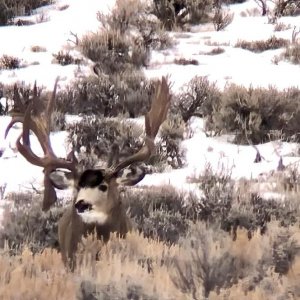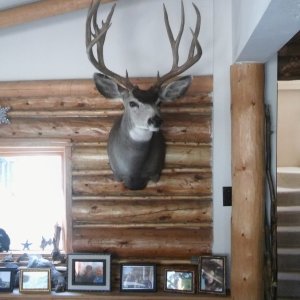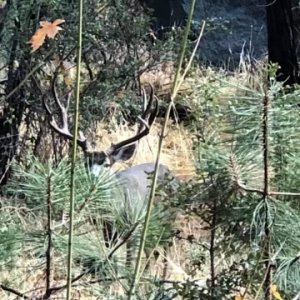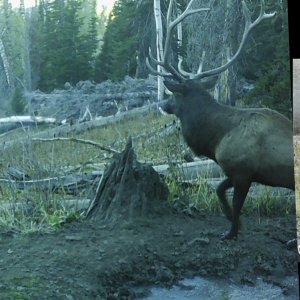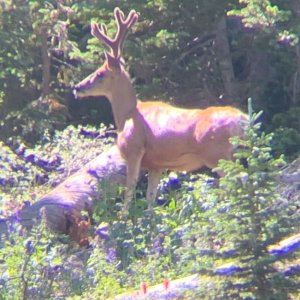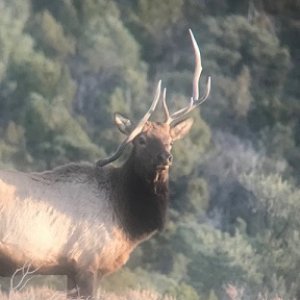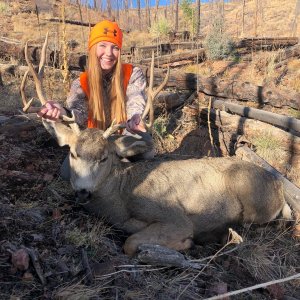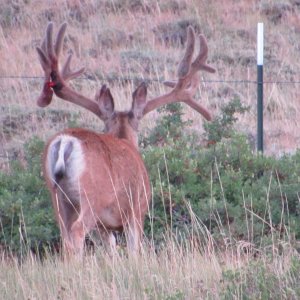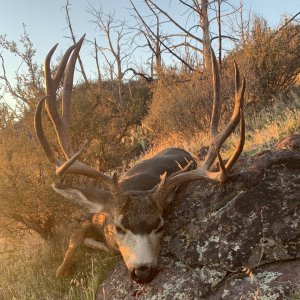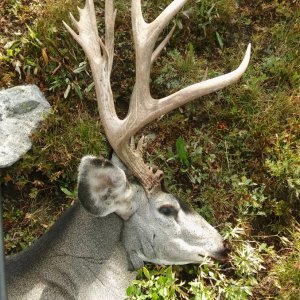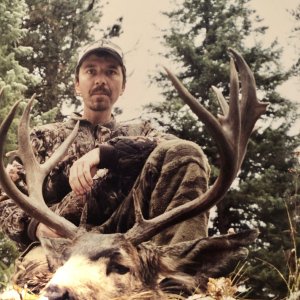I have a general state wide turkey tag this year (my first) and was wondering if any had any advice as to where to find some on public land near me and also any tips or tricks to be successful. I live in Fountain Green, Utah. I have seen a lot of turkeys near here but they are all on private land. I have tried going up the canyon to the public land and using various calls with no response. I have driven up several canyons in the area and have heard and seen nothing. As this is my first attempt I am thinking I must be doing something wrong. Any advice would be greatly appreciated.
You are using an out of date browser. It may not display this or other websites correctly.
You should upgrade or use an alternative browser.
You should upgrade or use an alternative browser.
Let?s talk turkey
- Thread starter jimmer
- Start date
bullskin
Very Active Member
- Messages
- 1,341
LAST EDITED ON Apr-20-18 AT 05:44AM (MST)[p]LAST EDITED ON Apr-19-18 AT 01:05?PM (MST)
I do not know your area, but have done a lot of turkey hunting, and so may be able to help with that. To begin, you have to find some birds. Look along the roadways for tracks in the mud. Or, get out in the woods and look for places where they have been scratching in the pine straw or oak leaves for insects, acorns, or other mast seeds/nuts, which will remain their primary source of food until the grass gets good and green. At that point, they may move toward open meadow land--perhaps even to pull over cow pies and eat insect larvae. It is not important to have a lot of birds--I would rather have one gobbler to myself than split a dozen among two or three hunters who will quickly silence every bird in the area. Do not assume that an area has no turkeys simply because you do not hear them. I have, on many occasions, heard a half-dozen gobblers in a canyon one day and then complete silence the next. Turkeys do not travel far once they begin breeding. They will be there, and the trick is to avoid educating them by showing yourself and calling too much. This is a real problem for novices. If the best way to locate a turkey is to call him, they assume, then the best way to locate a silent turkey is to call more. Over the course of three decades I have learned that over-calling is the kiss of death. If I have an interested turkey, I will happily respond to every gobble he makes, but I will not call simply to hear him gobble in return. I want to appear interested, even excited, but not desperate. A gobbler will expect a desperate hen to come to him. If you have turkeys in the area (especially educated ones) that are not calling much, then simply walk slowly into the area while yelping SOFTLY (only three or four times with each effort) about every ten minutes, perhaps one-hundred yards between calls. Then, pick a set-up position AWAY from your last calling position and sit quietly until you hear a cluck or even a gobble indicating that a bird has come to investigate. Then call. It may take an hour or more of quiet time before anything develops, and it is for this reason that you should not set up at your last calling position. The bird will focus on that point and will probably see you before you do him--it is very hard to sit motionless for an hour or even two. The key to killing a turkey is setting up in a location that he will be comfortable approaching, but which will not conceal him from your view or restrict your ability to swing your shotgun in his direction (which, incidentally, you must do before he arrives or while his head is completely concealed behind a tree or other barrier to sight). There are a lot of great calls on the market this year, but there are even more lousy ones. I would recommend a box call for a beginner, mostly because it may force one to tone it down (most beginners call way too loud and way too often). That said, many box calls are terrible. Some manufacturers coat the paddle with a slick finish that makes it impossible to develop the friction that it needs to work. If you have $100 or so, contact Tommy Heppler for a custom-made call. That may sound like a lot of money, but it is less than you will spend trying to find a decent, mass-produced call at your local Bass Pro shop. Over the years I have purchased, and then thrown away, dozens of box, snuff, slate push-pin, etc call and perhaps a hundred mouth calls. Quite simply, most of the calls out there just suck. A good, modestly-priced alternative are the Lynch's calls. I would get the cheaper mahogany (not walnut) World Champ call. Whatever you choose, if it is a box call, keep it well-chalked. If it is a slate, then use a scotch brite pad on it regularly to keep it (and the tip of your striker) rough and free of grime. Once hunting, avoid pressuring the birds. Do not keep calling to an unresponsive bird. Instead, give him a few hours off and then try again. Or return another day. A bird that is occupied in the morning may be desperate for attention by late afternoon. While moving to your set-up site, listen for turkeys drumming or scratching in the leaves to avoid bumping them. Do not wander around just trying to find one, and do not try to stalk them--they have much better eyes than we do. Above all, relish the experience. Nobody will kill every bird, every time. And no one can tell you how to hunt well. You will learn as you go. You will make mistakes, and each will help you develop into a better hunter. I know a lot of folks who have hunted for decades and who could not kill a turkey if their lives depended on it because they have always been accompanied by experienced hunters who do the hunting for them. In the end, success lies in understanding turkey behavior, which is great, because even "unsuccessful" hunts will help you gain these insights. Quite simply, the is no bad turkey hunt, and the most difficult hunts are the best.
I do not know your area, but have done a lot of turkey hunting, and so may be able to help with that. To begin, you have to find some birds. Look along the roadways for tracks in the mud. Or, get out in the woods and look for places where they have been scratching in the pine straw or oak leaves for insects, acorns, or other mast seeds/nuts, which will remain their primary source of food until the grass gets good and green. At that point, they may move toward open meadow land--perhaps even to pull over cow pies and eat insect larvae. It is not important to have a lot of birds--I would rather have one gobbler to myself than split a dozen among two or three hunters who will quickly silence every bird in the area. Do not assume that an area has no turkeys simply because you do not hear them. I have, on many occasions, heard a half-dozen gobblers in a canyon one day and then complete silence the next. Turkeys do not travel far once they begin breeding. They will be there, and the trick is to avoid educating them by showing yourself and calling too much. This is a real problem for novices. If the best way to locate a turkey is to call him, they assume, then the best way to locate a silent turkey is to call more. Over the course of three decades I have learned that over-calling is the kiss of death. If I have an interested turkey, I will happily respond to every gobble he makes, but I will not call simply to hear him gobble in return. I want to appear interested, even excited, but not desperate. A gobbler will expect a desperate hen to come to him. If you have turkeys in the area (especially educated ones) that are not calling much, then simply walk slowly into the area while yelping SOFTLY (only three or four times with each effort) about every ten minutes, perhaps one-hundred yards between calls. Then, pick a set-up position AWAY from your last calling position and sit quietly until you hear a cluck or even a gobble indicating that a bird has come to investigate. Then call. It may take an hour or more of quiet time before anything develops, and it is for this reason that you should not set up at your last calling position. The bird will focus on that point and will probably see you before you do him--it is very hard to sit motionless for an hour or even two. The key to killing a turkey is setting up in a location that he will be comfortable approaching, but which will not conceal him from your view or restrict your ability to swing your shotgun in his direction (which, incidentally, you must do before he arrives or while his head is completely concealed behind a tree or other barrier to sight). There are a lot of great calls on the market this year, but there are even more lousy ones. I would recommend a box call for a beginner, mostly because it may force one to tone it down (most beginners call way too loud and way too often). That said, many box calls are terrible. Some manufacturers coat the paddle with a slick finish that makes it impossible to develop the friction that it needs to work. If you have $100 or so, contact Tommy Heppler for a custom-made call. That may sound like a lot of money, but it is less than you will spend trying to find a decent, mass-produced call at your local Bass Pro shop. Over the years I have purchased, and then thrown away, dozens of box, snuff, slate push-pin, etc call and perhaps a hundred mouth calls. Quite simply, most of the calls out there just suck. A good, modestly-priced alternative are the Lynch's calls. I would get the cheaper mahogany (not walnut) World Champ call. Whatever you choose, if it is a box call, keep it well-chalked. If it is a slate, then use a scotch brite pad on it regularly to keep it (and the tip of your striker) rough and free of grime. Once hunting, avoid pressuring the birds. Do not keep calling to an unresponsive bird. Instead, give him a few hours off and then try again. Or return another day. A bird that is occupied in the morning may be desperate for attention by late afternoon. While moving to your set-up site, listen for turkeys drumming or scratching in the leaves to avoid bumping them. Do not wander around just trying to find one, and do not try to stalk them--they have much better eyes than we do. Above all, relish the experience. Nobody will kill every bird, every time. And no one can tell you how to hunt well. You will learn as you go. You will make mistakes, and each will help you develop into a better hunter. I know a lot of folks who have hunted for decades and who could not kill a turkey if their lives depended on it because they have always been accompanied by experienced hunters who do the hunting for them. In the end, success lies in understanding turkey behavior, which is great, because even "unsuccessful" hunts will help you gain these insights. Quite simply, the is no bad turkey hunt, and the most difficult hunts are the best.
WiscoKid
Active Member
- Messages
- 314
Very good advice above. Another great tip for pressured birds (both by other hunters and predators) is often times they are very vocal on the roost and then once they hit the ground stop responding, so don't assume they are not there. If you can roost a bird in the evening, ideally roosting on public and then flying down to private if necessary it will take a lot of the guess work out. Again the scratching and tracks from a turkey will give you a lot of intel, but if you can get out before light and listen for gobbles on the roost, it can be a very big piece to the puzzle.

